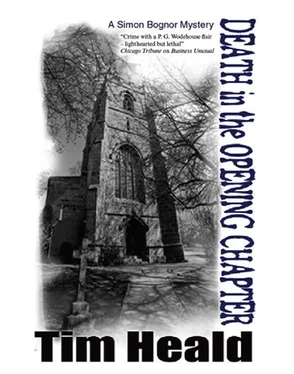Tim Heald - Death in the opening chapter
Здесь есть возможность читать онлайн «Tim Heald - Death in the opening chapter» весь текст электронной книги совершенно бесплатно (целиком полную версию без сокращений). В некоторых случаях можно слушать аудио, скачать через торрент в формате fb2 и присутствует краткое содержание. Жанр: Криминальный детектив, на английском языке. Описание произведения, (предисловие) а так же отзывы посетителей доступны на портале библиотеки ЛибКат.
- Название:Death in the opening chapter
- Автор:
- Жанр:
- Год:неизвестен
- ISBN:нет данных
- Рейтинг книги:5 / 5. Голосов: 1
-
Избранное:Добавить в избранное
- Отзывы:
-
Ваша оценка:
- 100
- 1
- 2
- 3
- 4
- 5
Death in the opening chapter: краткое содержание, описание и аннотация
Предлагаем к чтению аннотацию, описание, краткое содержание или предисловие (зависит от того, что написал сам автор книги «Death in the opening chapter»). Если вы не нашли необходимую информацию о книге — напишите в комментариях, мы постараемся отыскать её.
Death in the opening chapter — читать онлайн бесплатно полную книгу (весь текст) целиком
Ниже представлен текст книги, разбитый по страницам. Система сохранения места последней прочитанной страницы, позволяет с удобством читать онлайн бесплатно книгу «Death in the opening chapter», без необходимости каждый раз заново искать на чём Вы остановились. Поставьте закладку, и сможете в любой момент перейти на страницу, на которой закончили чтение.
Интервал:
Закладка:
It was the same with the name of his establishment. To most of the world, his pub would always be the Fludd Arms, or The Fludd, but Gunther didn’t believe that you would win Michelin stars with a place called the Fludd Arms, so he called it the Two by Two, instead. No one knew where the name came from, nor why he had chosen it, but it was the sort of name that won Michelin stars, and that was precisely what Gunther had achieved within a couple of years: one Michelin star, going on three.
The food at The Fludd used to be execrable, in the same way that Mrs Brandon’s food at the manor used to be. Traditional English: meat and two veg, with the meat an indeterminate shade of grey and the veg boiled to within an inch of its life, if not beyond. Bread sauce with most things, especially sausage and birds. Puddings, mainly steamed for as long as possible, and served with Bird’s custard, Tate and Lyle’s Golden Syrup or jam. The jam was usually strawberry and commercially manufactured in a jar which used to have a label featuring golliwogs until they became outlawed under some legislation that said they would incite white people to hatred of black ones, possibly even make them murder them. The Bognors thought this unlikely, but shrugged and let it pass in an old-fashioned and ultimately rather dangerous British manner.
Bognor’s young minion, Harvey Contractor, had obviously enjoyed his researches into the background of Gunther Battenburg. As Bognor had surmised, this was not his real name, nor German his nationality. He had been born around the Elephant and Castle, christened Frederick Micklewhite, some sort of cousin of the actor Michael Caine, another who had changed his name. Apparently, he had been having tea in some pseudo-swagger London hotel with his ‘image consultant’, who had told him that no celebrity chef could make it while named Micklewhite. ‘Let me be cake,’ said our man, parodying Marie Antoinette, but getting the third syllable wrong.
Battenburg and the deceased cleric had enjoyed a spectacular argument just two evenings before the crucial death. It had taken place at Gunther’s restaurant when the vicar had come calling. The entire community, apart from the squire and his lady – the Bognors’ host and hostess – seemed to know exactly what had happened, sentence by sentence, and, it seemed (though Battenburg denied fisticuffs), blow by blow. Sir Branwell, incidentally, resembled one of those old-fashioned pedagogues who claimed to know everything, while actually knowing nothing at all. The squire claimed to be omniscient and to have his finger on the pulse of the village. The reality was that the only person on whose person the squire’s finger actually lay – and lightly at that – was his wife. And the same went for her. Maximum claim of intelligence, minimum basis in fact: the bane of bad security services everywhere.
The Reverend Sebastian Fludd had had a good idea. ‘Good ideas’ were frequently fatal in Bognor’s view. They invariably seemed wonderful at the point of genesis, which was often the bath, but they almost always seemed less so at the point of delivery. It was also a mistake to start a conversation, particularly when one was the supplicant, with the words ‘I have an idea’. It seemed to be acknowledged that this was how the vicar opened. It was not good. The equivalent of a feeble loosener or underarm lob. It cried out to be hit over a distant boundary or smashed for an immediate winner.
Battenburg, aka Micklewhite, duly obliged.
‘I deal in food, not ideas,’ he said. ‘Recipes, maybe. Ideas are for boffins and buffoons.’
‘My big idea is to have a foodless Christmas dinner, with all profits going to the starving millions around the world.’
‘Bugger the starving millions,’ said the chef pithily.
‘I beg your pardon,’ said the reverend.
‘Granted,’ said Gunther. ‘My punters are paying a lot of money for their Christmas gourmet break. They expect some bang for their buck. Edible bang; drinkable bang; bang they can stuff in their gobs.’
From there on, the conversation had deteriorated, though whether or not words gave way to something more physical was a moot point.
At some point, apparently, Battenburg had threatened the vicar with death, though this was in dispute and vehemently denied by Battenburg, though affirmed by Dorcas Fludd who, needless to say, had evidence only at second-hand.
‘I see,’ said Bognor, finishing Contractor’s report and staring into space. As usual, when he uttered these words, he saw nothing and, even if he did, he saw it through a glass, darkly.
There had obviously been a clash and it was inevitable. Battenburg relied on conspicuous consumption for his living; the reverend owed what little living he enjoyed to sackcloth and ashes. Battenburg owed his ease to rich people eating and drinking more than they should, without regard to any of the consequences. Fludd was the opposite. He would have been happier in a world without wealth, a world in which everyone starved, a world in which not only was Jack as good as his master, but all Jacks were sprats.
Bognor sighed. He could see the point of view of Mammon, aka Gluttony, and he could see the point of view of the ascetic who wanted everyone else to be in a state of similar self-denial. Fence-sitting was a hazard as far as he was concerned. This didn’t mean that he was slow to apportion real blame and to find people guilty. Nor did it involve a suspension of prejudice. He was always on the side of indulgence and against abstinence. That didn’t, however, make him unprofessional.
So, did he believe that the chef murdered the vicar? On balance, no. Chef Battenburg, in the heat of the moment, with a knife. Well, yes. Plausible. This, however, was a cold-blooded, premeditated crime and Battenberg did not seem that sort of person. Crime de passion in the heat of the kitchen, but not a murder in the still watches, in the presence of God. That was Bognor’s feeling and, on the whole, his feelings served him well. They were not, however, infallible and while he was always careful to take them into account, he never allowed them to overrule ratiocination. So Battenburg could have done it. Of course he could. And he had a thoroughly plausible motive. Instinct said no, and the heart was often as reliable as the head.
Sir Branwell and Lady Fludd had only eaten at the Two by Two once since Battenburg took the place over and changed its name, but Sir Branwell pronounced it poncey and Camilla did not disagree. Not that the Fludds were unadventurous. They went abroad and ate well; the food at Sir Branwell’s club was quietly ambitious and Sir Branwell quite enjoyed it. They particularly enjoyed Wilton’s in Jermyn Street whenever a rich friend or relation took them there, but that didn’t alter the fact that he found Gunther’s food ‘poncey’. It was a bit like changing one’s kit at the Hogarth Roundabout. There was some stuff that one simply didn’t eat on home turf, and Battenburg’s came into that category. Likewise, the decor; though the cellar, despite new world additions, remained passable.
The chef was preparing snail porridge, the idea for which had been cribbed from his friend Heston Blumenthal, when the Bognors came calling.
Snail porridge was an unusual starter for the literary festival’s inaugural supper, but it made a change from prawn cocktail, and it was, for many of the guests, acceptable and surprising.
Supper came after evensong and Sebastian’s sermon. Snail porridge followed his grace. This year, His Grace, the Rt Rev. Ebenezer, would fill the gap, but meanwhile Bognor had some questions to ask the chef.
TEN
‘ Tell me, chef,’ began Bognor, enjoying the cliche and wondering why Gunther was wearing a toque and check trousers, ‘where were you yesterday, between the hours of five and seven?’
Читать дальшеИнтервал:
Закладка:
Похожие книги на «Death in the opening chapter»
Представляем Вашему вниманию похожие книги на «Death in the opening chapter» списком для выбора. Мы отобрали схожую по названию и смыслу литературу в надежде предоставить читателям больше вариантов отыскать новые, интересные, ещё непрочитанные произведения.
Обсуждение, отзывы о книге «Death in the opening chapter» и просто собственные мнения читателей. Оставьте ваши комментарии, напишите, что Вы думаете о произведении, его смысле или главных героях. Укажите что конкретно понравилось, а что нет, и почему Вы так считаете.












